Khamenei Aide Says Prophet Mohammed Predicted Iran's Revolution
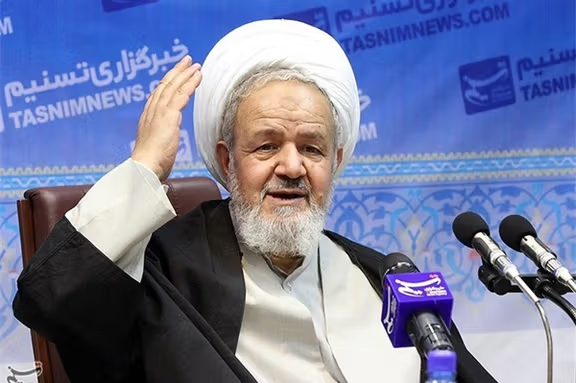
The head of the Political and Ideological Office of Iran’s Supreme Leader claims that the Quran has some predictions about the occurrence of the 1979 Revolution in Iran.

The head of the Political and Ideological Office of Iran’s Supreme Leader claims that the Quran has some predictions about the occurrence of the 1979 Revolution in Iran.
Ali Saeedi Shahroudi also added that the Prophet of Islam and the 7th Shia Imam also predicted Iran’s revolution and the leadership of Ruhollah Khomeini.
“Islamic revolution took place while the world was under the domination of the two superpowers, the United States and the Soviet Union, and the countries of the world were either part of the Western bloc, or part of the Eastern camp and supported by the Soviet Union,” he added.
However, he said, the Islamic Revolution came took place with the slogan of "Neither East nor West" and relying "purely Islam."
Most of the world Muslims are Sunnis and they do not follow Iranian religious leaders or doctrine.
‘Neither East nor West’ was the foreign policy approach promulgated by the founder of the Islamic Republic Ayatollah Ruhollah Khomeini and was Iran's official foreign policy motto until ‘Looking East’ came about.
The policy of relying on Asia or the East, particularly China and Russia, was promulgated by Supreme Leader Ali Khamenei in 2018, with the catchphrase, “Looking East”.
"We should look East, not West. Pinning our hope on the West or Europe would belittle us as we will have to beg them for favors and they will do nothing," Khamenei said in a speech in October 2018.
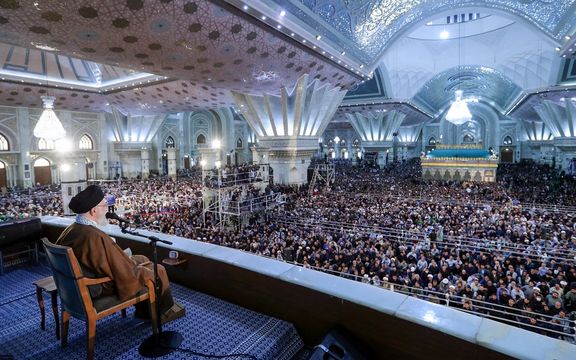
Tactical compromises with “the enemies” will not reduce their enmity Supreme Leader Ali Khamenei said on the death anniversary of Ayatollah Ruhollah Khomeini.
“Our young people should pay attention. The enmity of world arrogance will not disappear with tactical retrenchments. Some imagine that if we retreat on some issue, their enmity will decrease against us. This is a mistake,” the 83-year-old ruler said.
‘World arrogance’ is a term coined by the Islamic Republic to refer to the United States, which it claims wants to subjugate Iran. Anti-Americanism is the ideological cornerstone of the regime Khamenei has created during more than three decades of his authoritarian rule.
In the speech, Khamenei seemed to be speaking both about tactical or partial retreats both by Iran and its enemies, but he clearly tells the audience that any concession by the Islamic Republic will not pacify the United States and end its “enmity”.
Khamenei in his televised speech on Sunday praised Khomeini, the founder of the Islamic Republic who died in June 1989. He said the revolutionary leader was a world figure who had a lasting impact on Iran, the Muslim world and the international community.
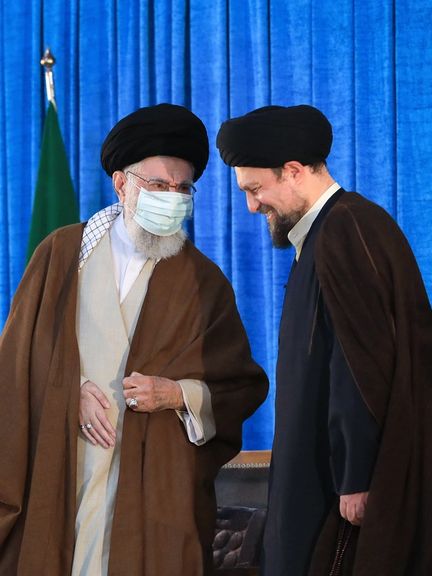
Khamenei replaced Khomeini as Supreme Leader a few days after the revolutionary cleric’s death but lacked his stature, reputation and political power. During more than three decades, however, Khamenei has built powerful repressive institutions and killed thousands of ordinary people protesting his dictatorship.
Khamenei warned that no matter what diplomatic developments take place “Objectives do not change, confrontation remains constant, but the Iranian nation has become stronger.”
What poses a threat to the Islamic Republic, he said, “is to forget enmity.” He added that across the world there are forces ready to invade others and will do so wherever they can.
Despite his persistence in portraying the United States and the West as an enemy, Khamenei finds himself in an extremely difficult situation, facing a deep economic crisis and domestic unrest.
That reality also was apparent in his speech. He called on his followers to have “hope” and show the same resilience that, according to him, Khomeini displayed during his life.
“Whoever loves Iran and upholds national interests, whoever wants to see improvement in the economic situation, whoever wants to see Iran in an honorable international position, should strive to boost faith and hope among the people,” Khamenei stressed.
He also repeated his long-held argument that “the enemy” most of all wants to weaken the nation’s faith and hope.
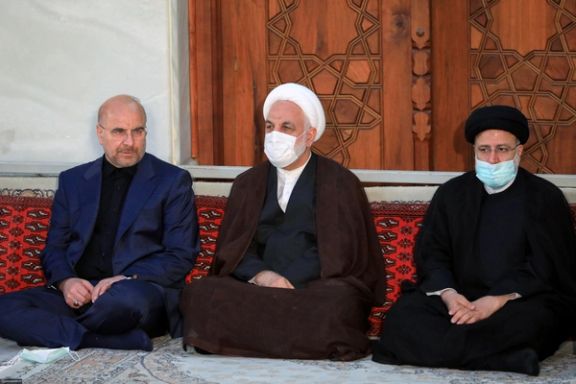
This political rhetoric bands everything Khamenei does not like into what the enemy is after. Women’s right, political freedoms, economic demands are all plots by the enemy. His underlings readily repeat this message and accuse those who have any criticism of “working for the enemy’s objectives.”
Along the same rhetoric, Khamenei also repeated his earlier claims that the recent nationwide protests were a plot hatched by the enemies. He told his followers that the enemy thought it had organized everything so well that “the fate of the Islamic Republic was sealed.” They were wrong he boasted.
Government forces killed more than 500 civilians and arrested more than 20,000 people until February, and more persecution and arrests continue.
Amid extremely high inflation and poverty, Khamenei said, “The aim of the enemy is to sow despair among the youth. There are some difficulties, and the enemy tries to constantly remind our young people about these problems. Inshallah, all these difficulties will be resolved.”
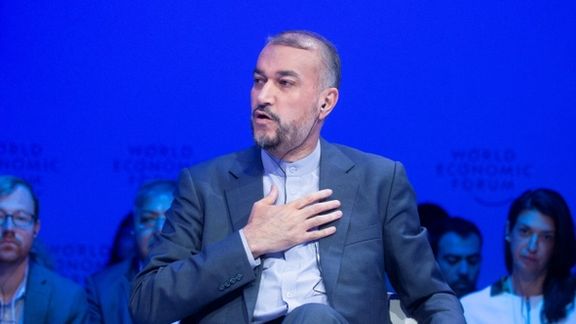
After Tehran exchanged Western hostages with its convicted diplomat, Foreign Minister Hossein Amir-Abdollahian claims Iran is "completely safe" for tourists.
He wrote on Twitter Saturday that “if some European citizens are not exploited by foreign security services, there is no reason to arrest them.”
Over the years Iran has detained and accused dozens of Western visitors of espionage, while using them effectively as hostages to squeeze concessions from the West. Detainees do not receive fair legal protection and face sham trials.
On Friday, two Iranian-Austrian citizens named Kamran Qaderi and Masoud Mosaheb and a Danish individual imprisoned in Iran were released in the framework of a recent prisoner exchange agreement with Belgium mediated by Oman.
A week ago, Olivier Vandecasteele, a Belgian aid worker, returned to his country in exchange for the release of Assadollah Asadi, an Iranian agent disguised as a diplomat in Europe who was convicted of a terror plot in France in 2018.
In another development, the Ministry of Foreign Affairs of the Republic of Azerbaijan in a statement on Saturday asked its citizens not to travel to Iran.
Baku also asked its citizens who are now in Iran to observe security measures more than before.
Tensions have been high between Iran and Azerbaijan since November 2022 when both sides accused each other of engaging in terrorism and espionage.
Azerbaijan closed its embassy in Tehran after an armed attack on its embassy in Tehran in January and then expelled four Iranian diplomats over what it called “provocative actions.
Tehran has also accused Baku of harboring Israeli intelligence and military elements that plan to use its territory in a possible attack against Iran’s nuclear facilities.
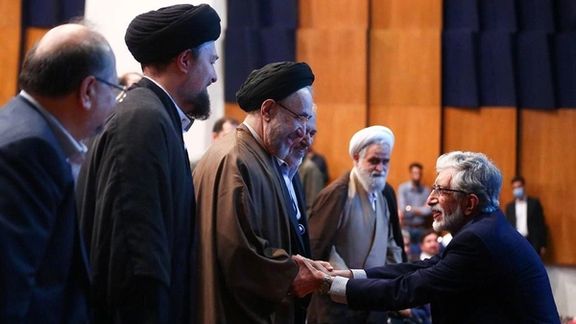
Iran's hardliner Paydari Party has dismissed long-time conservative figure Gholam-Ali Haddad-Adel's leadership of an umbrella group for a handshake with a moderate.
Paydari's break with the coalition occurred this week after long-time conservative figure Haddad-Adel shook hands with former reformist President Mohammad Khatami at a commemoration ceremony on Tuesday.
The former president has long been shunned by conservatives loyal to Supreme Leader Ali Khamenei. State media have even been barred from showing his image or say anything positive about him, although during eight years in office Khatami hardly challenged the authoritarian ruler.
Paydari used to join coalitions with other conservative parties ahead of almost all elections since mid 2000s, but it invariably left all coalitions at one point before an election and went its own separate way.
However, if Paydari stands on its word this time, it would be a first even for the notorious spoiler group eight months before the 2024 parliamentary vote.
Reformist newspaper Shargh called the development "a confrontation between radical and moderate conservatives," although Haddad-Adel can hardly be characterized as a moderate.
The development also revealed, though belatedly, why the host of the meeting, Hassan Khomeini, the grandson of the founder of the Islamic Republic Ayatollah Ruhollah Khomeini, had to apologize to an Iranian Labor News Agency (ILNA) reporter who was beaten up by his bodyguards and kept in a shed for several hours. The reporter was assaulted apparently when he tried to take photos of Haddad-Adel shaking hands with Khatami.
According to Sharq, Haddad-Adel was criticized by Paydari for remaining at the commemoration event after he found out that individuals such as Khatami and former Foreign Minister Mohammad Javad Zarif were also there. The hardliners said Haddad Adel should have done what Kayhan's firebrand editor Hossein Shariatmadari did. He left the session a few minutes after the opening speech by a reformist figure.
Shaking hands is nothing more than a sign of politeness and courtesy, wrote Shargh, but it was different for Paydari, because Haddad Adel and reformist figures were involved. That makes it a meeting which has something to do with elections and the rivalry between political factions.
Shargh pointed out that Haddad-Adel certainly knew beforehand that reformists will be present at the ceremony. It also reminded that Haddad-Adel was the first political figure to accuse Khatami as being one of the perpetrators of the post-election unrest in 2009 which led to his isolation on Iran's political scene. But apparently the old conservative leader thought a handshake was needed with the ex-president.
Hamid Rasaei, a Paydari figure wrote after the photo showing Haddad-Adel shaking hands that Khatami was "one of the leaders of the coup in 2009 and the ensuing seditions."
What Khamenei loyalists call a sedition was popular protests when Mahmoud Ahmadinejad was quickly declared the winner of the presidential election in 2009 in a highly disputed move.
Shargh further pointed out that the episode revealed that Iran's conservatives see the upcoming election in March as a game reserved only for their candidates where no reformist should be allowed to play.
As a further indication of that, Shargh noted that the Strategic Network of the Supporters of the Islamic Revolution [Persian acronym SHARIAN] ,another conservative coalition which is also close to Paydari has made it clear in a recent meeting that their list of candidates will include no so-called moderate conservatives.
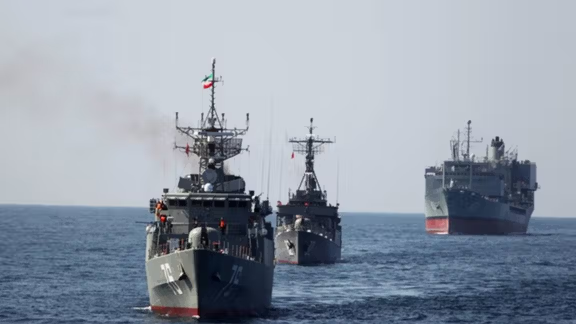
Iran's navy commander said Saturday his country and Saudi Arabia, as well as three other Persian Gulf states, plan to form a naval alliance, including India and Pakistan.
"The countries of the region have today realized that only cooperation with each other brings security to the area," Iranian army's navy commander Shahram Irani was quoted as saying.
Iranian media had mentioned a new naval alliance this week without providing any details. There have been no hints by other regional countries about such a development.
Iran's Revolutionary Guard also has a navy along with the army's maritime force.
However, the United Arab Emirates unexpectedly announced May 31 that it had withdrawn from the US-led 34-nation Combined Maritime Forces coalition, which if true, signals a further weakening of the US position in the Middle East.
The Combined Maritime Forces task force, headquartered at the US naval base in Bahrain, works on security, counterterrorism and counter-piracy in the Red Sea and the Persian Gulf areas. But in fact, the US and Israel were trying to forge a regional coalition to contain Iran, including an air defense network.
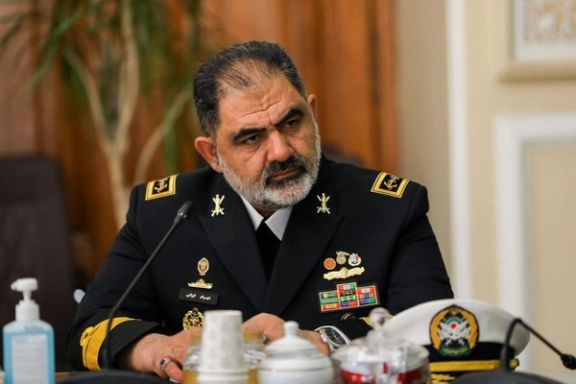
"As a result of our ongoing evaluation of effective security cooperation with all partners, two months ago, the UAE withdrew its participation in the Combined Maritime Forces," the Ministry of Foreign Affairs said in a statement.
However, the US 5th Fleet on June 1 politely refuted the UAE claim and said that the country was still a "partner" in the multinational coalition.
The Iranian navy commander did not elaborate on the shape of the alliance that he said would be formed soon.
Iran has recently been trying to mend its strained ties with several Persian Gulf Arab states.
In March, Saudi Arabia and Iran ended seven years of hostility under a China-mediated deal, stressing the need for regional stability and economic cooperation.
At the time the deal was seen as a shift in Saudi foreign and security policies that for decades has relied on the United States for protection in return for a steady flow of oil at reasonable prices.
Tehran rejoiced the agreement with Riyadh, with officials repeatedly proclaiming a great diplomatic victory against Washington and another step toward their proclaimed goal of “expelling America” from the region.
Naval commander Irani said the states that will take part in the alliance also include the United Arab Emirates (UAE), Bahrain, Qatar, Iraq, Pakistan, and India.
Iranian officials often make exaggerated claims to boost domestic morale and Irani’s claims have to be echoed by regional Arab countries to have any credibility.
The region contains some of the world's most important shipping routes where, since 2019, suspected Iranian attacks began against oil tankers amid tensions with the United States. The Obama, Trump and Biden administrations chose not to retaliate against Iranian naval provocations over the years or show a convincing military deterrent response.
In its latest provocation in May, Iran seized two oil tankers transiting between UAE ports.
Saudi Arabia's rapprochement with Iran has frustrated Israel's efforts to isolate Iran diplomatically.
The UAE, which was the first Persian Gulf Arab country to sign a normalization agreement with Israel in 2020, resumed formal relations with Iran last year.
Bahrain and Morocco later joined the UAE in establishing ties with Israel.
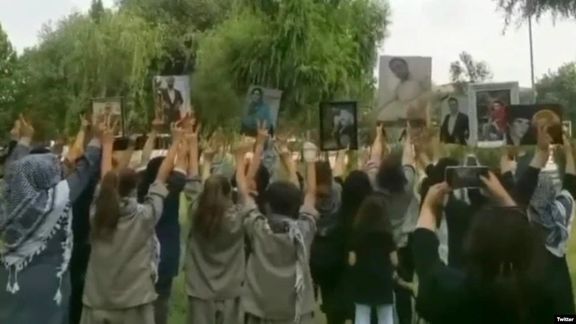
Iranians in the western city of Mahabad held a rally and chanted anti-government slogans to mark the 40th anniversary of the mass execution of 59 youths in the 1`980s.
Videos show security and law enforcement forces surrounded the cemetery of the city an hour before a scheduled ceremony and closed the entrances.
Although the roads to the cemetery were blocked, a group of people gathered near the location holding the pictures of those executed on June 2, 1983. They also carried the photos of those killed during “Woman, Life, Freedom” protests since September 2022.
The protesters chanted slogans like "The Dictator Is Afraid of Us" and "The Martyr Never Dies".
On June 2, 1983, the Iranian regime executed 59 people in the Kurdish-majority city of Mahabad for suspected opposition and based on unknown charges.
Since the establishment of Islamic republic, the regime has mounted massive military, economic, cultural, social and psychological pressures against ethnic Kurds.
Mahsa Amini who died after being arrested by the morality police in September 2022 for "improper hijab" was a 22-year-old Kurdish-Iranian woman. Her death ignited the largest and longest anti-regime nationwide protests in Iran.
The massacre of the prisoner took just a few minutes, while they had no chance to appeal for pardon while some of them were under 18.
The Islamic Republic calls the Kurdish armed groups in the western provinces of Iran, "terrorist groups" or "anti-revolutionary" but these groups say that the goal of their armed campaign is "defending the rights of the Kurds".